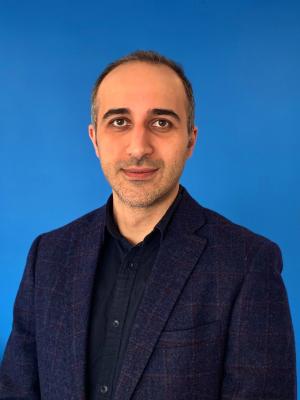Ph.D. student: Ali Kamali
Dissertation title: Low Energy Electron Induced Dissociation of Potential Gold Containing focused electron beam induced deposition Precursor Molecules
Opponents:
Dr. Štefan Matejčík, Professor at the Comenius University in Bratislava, Slovakia
Dr. Ivo Utke, Team leader at EMPA in Thun, Switzerland
Advisor: Dr. Oddur Ingólfsson, Professor at the Faculty of Physical Sciences, University of Iceland
Doctoral committee:
Dr. Hubertus Marbach, Professor at the Friedrich-Alexander-Universität in Erlangen-Nürnberg, Germany
Dr. Janina Kopyra, Associate Professor at the Siedlce University,Poland
Chair of Ceremony: Dr. Einar Örn Sveinbjörnsson, Professor and the Head of the Faculty of Physical Sciences, University of Iceland
Abstract:
The focused electron beam-induced deposition (FEBID) process, a 3D nanofabrication technique, involves the utilization of a concentrated electron beam of high energy to dissociate precursor molecules that are adsorbed on a substrate, resulting in the creation of both volatile and non-volatile fragments. The former are pumped away and the latter are deposited on the substrate to form the desired 3D nanostructures. Close to any arbitrary form may be generated by a combination of beam movements and its dwell time at the respective locations. As an electron beam collides with a substrate, many interactions can take place, including scattering, secondary electron emission, Auger electron emission, and ionization. The secondary electrons can interact with the deposit and the substrate and induce processes including dissociative ionization, dissociative electron attachment, neutral dissociation, and dipolar dissociation of the precursor molecules. FEBID encounters challenges such as impurities and lateral broadening of deposited structures. These issues arise from the partial decomposition of precursor molecules induced by low energy electrons and the spatial distribution of secondary electrons beyond the focal point of the primary electron beam.
To address these challenges, gas phase and surface studies of FEBID precursor molecules can aid in understanding electron interactions in the low-energy range of secondary electrons. This thesis focuses on studying gold precursor molecules [(CH3)AuP(CH3)3], [(CH3)2AuCl]2, and [CF3AuCNC(CH3)3], with respect to their fragmentation through dissociative electron attachment (DEA) and dissociative ionization (DI) in the gas phase under single collision condition and the respective deposit formation in FEBID under ultra-high-vacuum. Quantum chemical calculations are conducted at the DFT and coupled cluster levels of theory to support the interpretation of the observations made in the experiments. The results from these studies are discussed with respect to low energy electron induced fragmentation of these precursors in general and how that is reflected in the elemental composition of the deposits formed in FEBID. Specifically, the suitability of these precursor molecules for the creation of high content gold nanostructures in FEBID is discussed in this context.
About the doctoral candidate:
Ali Kamali was born in Iran and received his BSc and MSc degrees in Materials Engineering from the Shiraz University and the Babol University of Technology, respectively. In 2017, he started his doctoral studies in Chemistry at the University of Iceland and worked on gold complexes for the FEBID technique.

